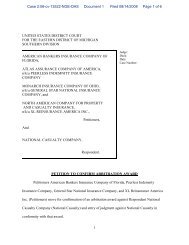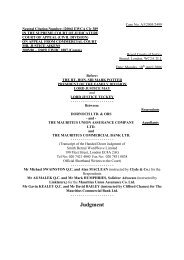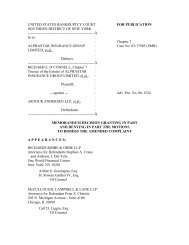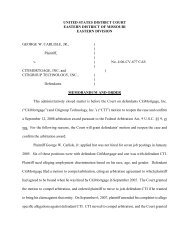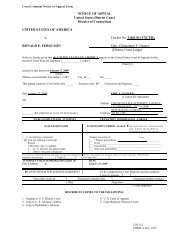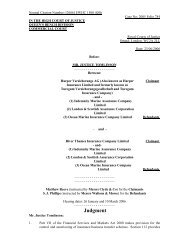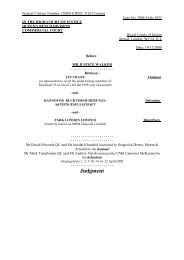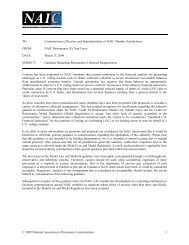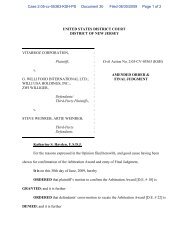Statutory Issue Paper No62R - Reinsurance Focus
Statutory Issue Paper No62R - Reinsurance Focus
Statutory Issue Paper No62R - Reinsurance Focus
Create successful ePaper yourself
Turn your PDF publications into a flip-book with our unique Google optimized e-Paper software.
SSAP No. 62R<br />
Statement of <strong>Statutory</strong> Accounting Principles<br />
Entry 1: Payment of Retrospective <strong>Reinsurance</strong> Premium<br />
Retrospective <strong>Reinsurance</strong> Expense* $16m<br />
Cash $16m<br />
The company pays $16m premium for the retrospective reinsurance contract.<br />
*This is an Other Expense item, it does not flow through Schedule F or Schedule<br />
P.<br />
Entry 2: Adverse Development Reaches the Attachment Point<br />
Losses Incurred $25m<br />
Gross Loss Reserve $25m<br />
Recoverable on Retro <strong>Reinsurance</strong> Contract** $25m<br />
Other Income* $9m<br />
Contra – Retro <strong>Reinsurance</strong> Expense* $16m<br />
Surplus*** $9m<br />
Segregated Surplus*** $9m<br />
The company incurs $25m development on reserves related to the contract.<br />
*These are Other Income/Expense items do not flow through Schedule F or<br />
Schedule P.<br />
**A contra-liability write-in item, not netted against loss reserves.<br />
***Surplus is segregated in the amount of [$25m - $16m = $9m] recoverables<br />
less consideration paid.<br />
Entry 3: Cash is Recovered on Paid Losses<br />
Cash $20m<br />
Recoverable on Retrospective <strong>Reinsurance</strong> Contract $20m<br />
Segregated Surplus $4m<br />
Surplus $4m<br />
The company recovers $20m cash from reinsurer on this retro contract.<br />
Segregated Surplus decreases in the amount of [$20m - $16m = $4m] (decreases<br />
for amount recovered in excess of consideration paid).<br />
35. Q: How should a ceding company account for payment of the premium for a retroactive<br />
reinsurance contract by the ceding company’s parent company or some other person not a<br />
party to the reinsurance contract (for example, adverse loss development reinsurance<br />
contracts purchased by the parent company in the context of the purchase or sale of the<br />
ceding company)?<br />
A: If the reinsurance premium is not paid directly by the ceding company but is instead paid<br />
on behalf of the ceding company by the ceding company’s parent company or some other<br />
entity not a party to the reinsurance contract, then the ceding company should (1) record<br />
an increase in gross paid in and contributed surplus in the amount of the reinsurance<br />
premium to reflect the contribution to surplus by the parent or third party payor, and (2)<br />
record an expense in the amount of the reinsurance premium and account for the contract<br />
as provided in Questions 33 and 34.<br />
© 2009 National Association of Insurance Commissioners 62-36


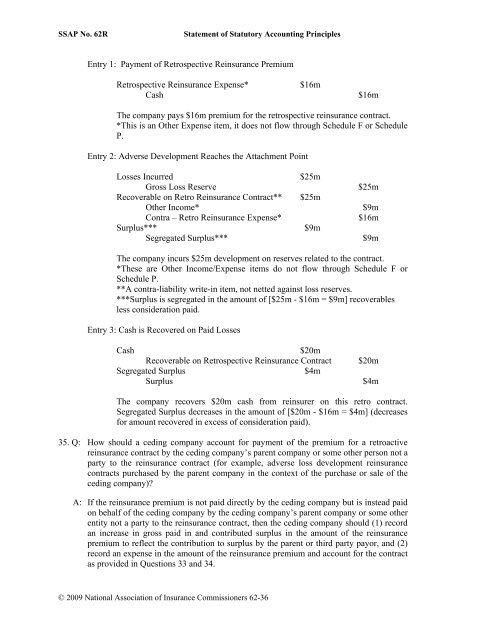
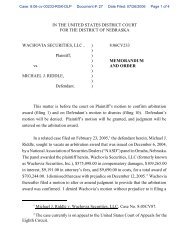
![202 Folio No 734 Neutral Citation Number: [2006] EWHC 1345 (QB ...](https://img.yumpu.com/50015000/1/184x260/202-folio-no-734-neutral-citation-number-2006-ewhc-1345-qb-.jpg?quality=85)
